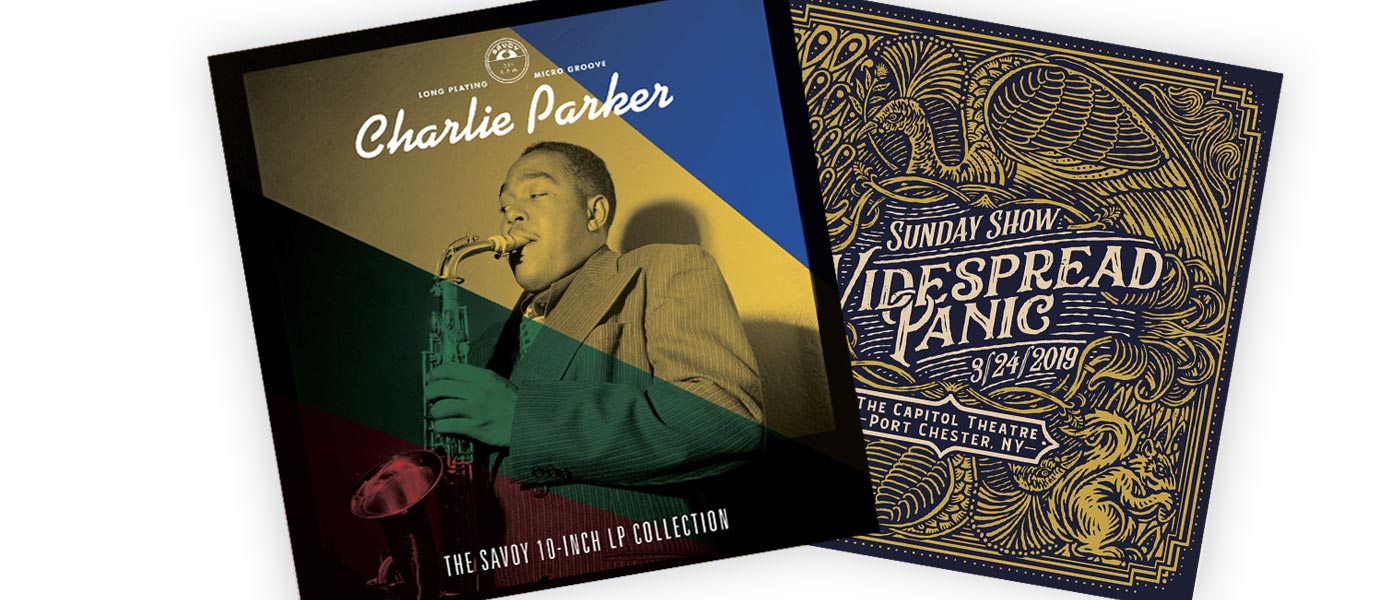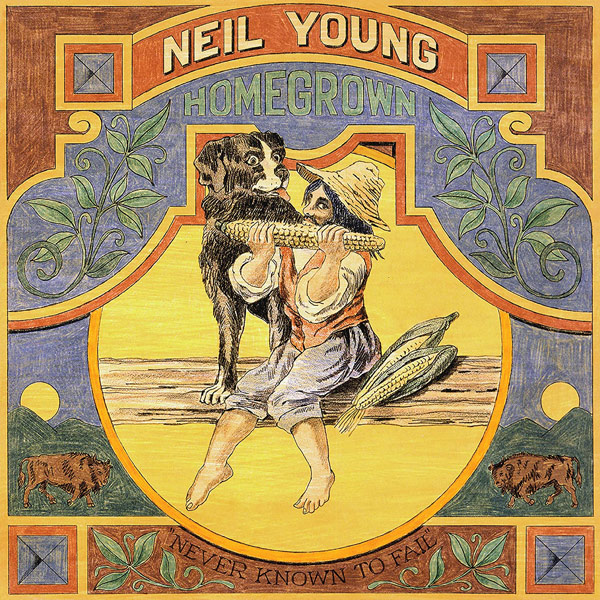
I’ve not really explored Neil Young’s online Archives with much diligence, but I bet it would do much to clear up my confusion about the timeline of his recordings and releases from the early to mid-‘70s. I can’t keep up. I know that he recorded multiple albums that were shelved for various reasons, sometimes because he’d moved on to his next Big Thing by the time an album was prepped for official release. He’s been called many things, but I doubt that “complacent” ever made the roster. In the case of Homegrown, the legendary album Young stashed in favor of Tonight’s the Night, he felt it was “too personal.” I think it’s too great to have sat on a dusty shelf for the entirety of my lifetime. But holding a grudge would hurt me more than him. I could never stay mad at you, Uncle Neil.
Gosh, this music is nice to have access to in 2020. Wood and steel and voices, man. A perfect antidote for… take your pick. The pandemic, the politics, the polarization, all of it. Young describes Homegrown as “the unheard bridge between Harvest and Comes A Time.” I call it an exemplary demonstration of his acoustic bent during the most satisfying decade of his career. I mean, you can strike gold at unexpected times across the entire duration of his working life (see Ragged Glory from 1990), but I’d take the decade that spans ’69-’79 if I had to choose. Glad I don’t.
Many of Young’s fans are partial to specific “versions” of Neil: Crazy Horse Neil, for example. I’ve never met anyone clamoring for a return of Experimental Electronic Neil (certainly not David Geffen), but for Acoustic Neil-heads, Homegrown must be a revelation, especially if they’ve been listening to the widely circulated bootleg versions all these years. The mostly acoustic instruments are alive and present, as are Ben Keith’s slippery pedal and laps steels. He provides a disorienting burst of electricity during the title track that would not have been out of place on Muswell Hillbillies. The sudden fade on that one makes it feel more like a sketch than a song, and “We Don’t Smoke It No More” suffers the same fate. But I’ll take it.
Homegrown feels like we’re on a farm in a giant communal house with all our friends hanging out and making music. Until the unsavory element shows up for “Florida” and “Vacancy.” Those songs sound like everyone got together intending to drink a couple of day beers and go to bed early, but a bunch of rowdies showed up with a case of moonshine instead. The bulk of the recordings are filmed in close-up, even the ones with full-band arrangements. It’s like you’re in the center of a circle of band members rather than looking on from without. “White Lines” is like being in a hotel room with Neil and Robbie Robertson while they workout on a couple of old acoustics. Even with all the tape in Neil’s legendary vault, we may not have it that good ever again.
Unfortunately, my pressing has some ticks in it. An initial spin on the record cleaner didn’t help much, but a more involved scrubbing did. “Mexico” was not salvageable. There is a visible pressing defect that spans that song, and it makes me want to find the person responsible and scream in their face like Lars Ulrich does to James Hetfield in that Metallica documentary. But I’d rather have Homegrown with some stems and seeds than no Homegrown at all.
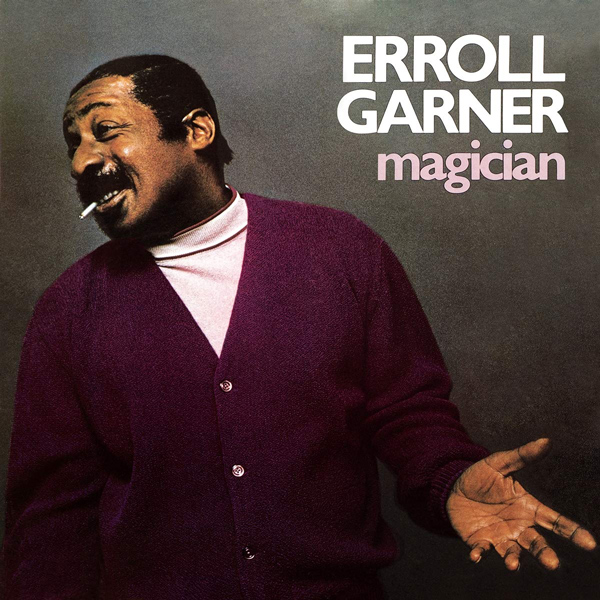
Magician, by Erroll Garner, was the second monthly record sent to me from Vinyl Me, Please as part of my Classics club membership. I jumped on that track specifically because those titles are all AAA productions pressed at QRP. For those who missed it, I was never that impressed by QRP’s work until I discovered Vinyl Me, Please. Somehow, VMP gets consistently stellar pressings out of the plants they partner with, no matter the plant’s prior reputation, and their QRP titles exemplify that trend. So… the reader can imagine my (lack of) excitement when I learned that Magician was not to be a AAA affair and that it would be pressed at Furnace Record Pressing in Virginia. Subscribers are given a short window to swap records from their chosen track if a month’s offering is not to their liking. Being unfamiliar with Garner’s and Furnace’s work, I considered swapping Magician but thought that I’d let VMP do its thing, just to see where the road took me. Sometimes it pays to let go of the wheel.
Let’s start by addressing this lack of an all-analog manufacturing process. As is the case with other Classics titles, Magician was mastered from the original tapes. But those tapes were doctored up with the Plangent Process, which is designed to (digitally) correct for variations in tape speed and to rectify issues related to “wow and flutter.” Those are the basics, and we won’t go any deeper here. The truth is out there for the intrepid reader. I’ll say this much: like the other Classics titles that we’ve explored so far, the Magician presentation is strikingly life-like and clear. I can’t tell that the final product has suffered from the introduction of the digital component at all, and I have to assume that it profited by it. (Otherwise, why bother?) We’re still working within the realm of the audiophile here. No question.
Secrets Sponsor
It is equally undeniable that the Furnace pressing in no way measures up to what VMP has gotten out of QRP recently. Whereas my Otis and Al records were gloriously silent throughout, Magician is only mostly silent. My copy had a foreign substance attached to it that took multiple rounds of cleaning to fix. I probably should have requested a replacement rather than handling it myself. Because now, I’m unsure if I hear residuals from this incident or if the ticks are just a result of Furnace’s less than perfect work. There’s enough noise throughout to make me wonder. We can thank COVID-19 for the change in pressing venue, and I’d have happily waited for QRP (although the following Aretha review will call into question whether or not that would have helped). I also understand the company’s (assumed) desire to deliver their products on time. I can’t help wondering if Magician will be repressed at QRP at some point. If so, it would be a nice gesture to extend members a discount if they choose to circle back for it.
I’m glad all that’s out of the way. Now, here’s the important part: I’ve had more fun listening to this record than any other I’ve acquired in the last year. Because Garner is like the Steph Curry of Jazz piano. He plays with more joy than any pianist I’ve heard. He makes “(They Long to Be) Close to You” sound like a lunar landing celebration. “Nightwind” resolves with a phrase that’s so perfect it seems familiar upon first listen. Like lifelong best friends speaking in their own code. The Gospel inflections during “One Good Turn” and the Latin flavoring that spices up “Mucho Gusto” suggests that Garner could have played anything you put in front of him. Except that he couldn’t read music! Which makes Magician somehow more… magical.
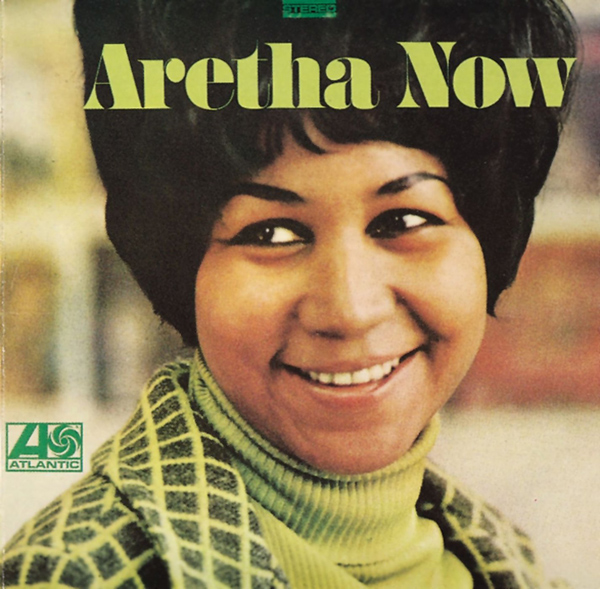
What do you most value in a vocalist’s style or performance? Power? Range? Control? Nuance and expressiveness? Those are some of the first traits that come to my mind, and it seems to me that Aretha Franklin is probably the artist with the most obvious claim to all of them. She’s like a boxer that won a title in every available weight class, by knockout. The audiophile community has certainly benefitted from some recent-ish Aretha reissues. Speakers Corner did Live At The Fillmore West a while back, and MoFi did Aretha’s Gold, thank goodness. But that’s about all I’m aware of, and that’s leaving a lot on the table. One that may have flown under the radar recently, definitely for me anyway, was VMP’s take on Aretha Now, which was Record of the Month for their Classics track back in February of this year. That predates my membership, but I circled back for it based on the strength of their other Soul Classics that I’ve gone over until y’all are probably tired of hearing about them. Moving right along…
The beauty of Aretha Now, in addition to the fact that it’s a musical killer, is that four of the tunes on it overlap with the ones on Aretha’s Gold. We all know what that means… It’s time for a shootout, by golly. A dual at high noon. Let’s see:
I enjoy listening to MoFi’s Aretha’s Gold so much that I awarded it Reissue of the Year for 2017. It’s a ton of fun, and it suffers from nothing, but it does demonstrate MoFi’s “sonic signature.” Much of the air was taken out of the room during the remastering process, which leads to a quieter experience in comparison to VMP’s, which I’m guessing more closely mimics the original release. The VMP take is “hotter” and a bit more visceral, whereas MoFi provides a more soothing experience. MoFi’s sounds “rounder” whereas VMP’s is edgier with a little hiss on top. VMP emphasizes the highs a bit more, which reveals a tasty Bluegrass-style guitar run during “Think” that jumped right out at me. VMP’s bass won’t necessarily get too deeply into your chest cavity, but it doesn’t need to. The tones are nicely balanced, and the bass is plenty present without overwhelming the other frequencies. There’s a gaggle of detail in both versions, and lots to explore. The primary difference, and it’s a sizable one, is that Aretha Now is a mono mix. I prefer that almost every time, and this is no exception. The other difference, also significant, is that my copy of Aretha Now has some obvious pressing defects, most notably a “whooshing” issue that spans the latter half of side one. I’m hoping that QRP isn’t backsliding, but unfortunately, I have evidence to suggest otherwise. (Stay tuned for next month’s review of their Bach/Starker box.) If we could take VMP’s mastering and marry it to MoFi’s pressing, we’d have ourselves a time, y’all.
As for the content, the listener is afforded a front-row seat to witness the joy of creation almost firsthand. I mean, the process of working out the vocal parts to “I Say A Little Prayer” (oddly enough, our second Burt Bacharach tune in this collection of reviews) seems to predate the Hip-Hop practice of completing each others’ phrases. Can we draw a line from Aretha and the Sweet Inspirations to Run and DMC? Let’s just do it and hang the consequences. The whole thing’s a gas, gas, gas—chills and tears and smiles for days.
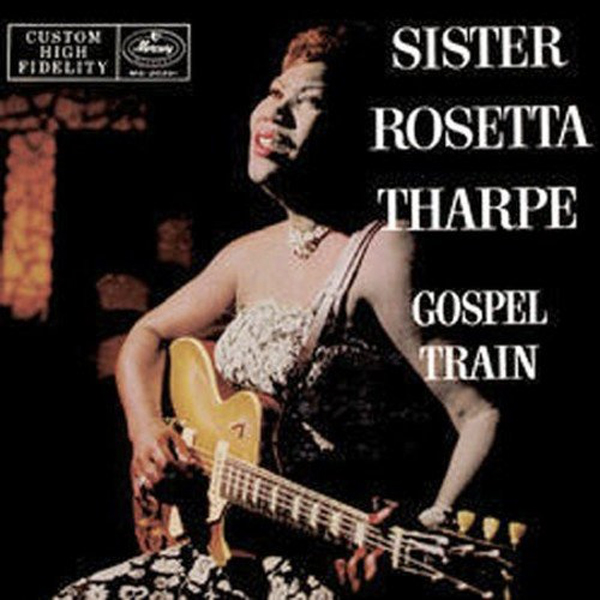
Man, I don’t even know where to start talking about Sister Rosetta Tharpe. Mostly because I don’t know much of anything about her. She performed at John Hammond’s “From Spirituals To Swing” event at Carnegie Hall around Christmas of 1939. (That show was designed in part to be Robert Johnson’s first exposure to a larger viewing public, but unbeknownst to the promoters, he had already died under mysterious circumstances in Mississippi while the event was being organized.) I’d imagine that Tharpe sort of straddled the line between those spirituals and that swinging music more so than anyone else on the bill over those two December New York City nights. She absorbed the slings and arrows of the Gospel community for mixing in the more secular aspects of popular music with the Lord’s music, much like Ray Charles would later. She was also a primary vocal influence on a young Little Richard, and Little Richard is probably the greatest Rock ’n Roll singer ever. So she had that going for her. That would have been enough, but she also informed Eric Clapton’s and Keith Richards’s development… as guitarists! So. Vinyl Me, Please did us all a solid by reissuing Sister Rosetta’s Gospel Train record from 1956 as a AAA affair in a pristine vinyl presentation pressed at QRP before the world caught fire. Maybe they had more time to fuss over this one than they did, Aretha Now because Gospel Train is pressed flawlessly.
And I had an original pressing sitting on my shelf for comparison. The most obvious difference is in the quality of the Vinyl itself. For many, including myself, that should typically be the case for a faithful reissue. My original copy would be considered “near mint” by most. It’s glossy and clean, but crackly throughout despite multiple deep cleanings. (I’d love to hear what an ultrasonic cleaner could do for such a record. Donations are gladly accepted.) The VMP reissue, as stated above, is completely free of insult or injury. QRP did a great job. Beyond that, the VMP take is just more open and robust. More pronounced bass response lends the listen a bit more heft without throwing the tonal balance off-kilter. When Tharpe goes up the neck to bend those high notes, they have a solid foundation to jump from, and all seems right in the world.
If Aretha’s confidence came from her realization of vocal mastery, Sister Rosetta’s might have come from simply not giving a flying rat’s ass about critics or convention. Her performances, as a vocalist and a guitarist, are impressively uninhibited. She’s so full of idiosyncrasies and personality that my speakers can barely contain her. (There’s a ton of live footage of her out there too. Just search the usual spots, and the rewards will flow forth. Reach out your hand.) Her biting guitar solos pepper the listener with slicing notes and trills. She bends the strings into and out of tune with abandon. Her vocals sound like she’s smiling. Wildly. All the time. And that translates across all these decades and all this distance and all this history. I’m unaware of any other performer with a style that could be considered similar.
VMP still has this one up and available for purchase. That suggests that it may not have sold as well as some of their other Records of the Month. My suggestion would be that you avail yourself of this fact. You’ll be smiling back at your speakers, smiling at you if you do.
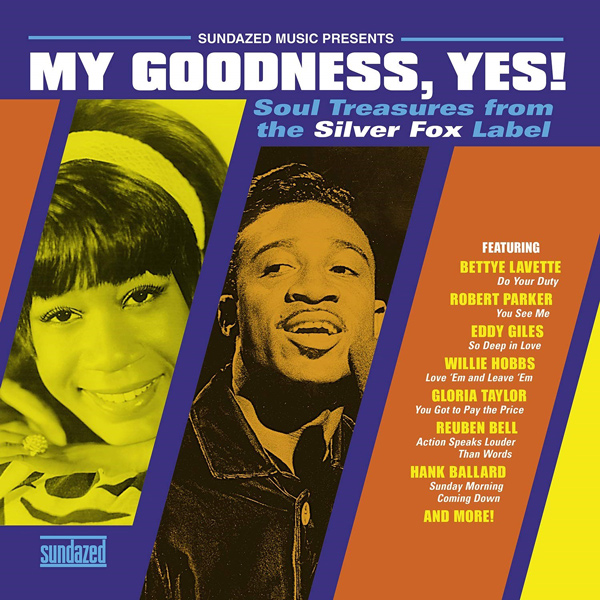
And that about does it for this month, but I thought I’d throw one in at the end to grow on. Not that the music will have to grow on anyone. It should take hold right away if anyone ever gets around to hearing it. We’re talking here about a recent compilation that Sundazed released called My Goodness, Yes! It’s comprised of R ’n B tunes by mostly obscure artists from 1969 and 1970 on Nashville’s Silver Fox label. There’s a companion piece compiling songs from Silver Fox’s parent label from around the same time. The two sets are populated by many of the same artists, in fact. Let’s see…
I chose this record for a few reasons. First: I love old Rhythm and Blues records, and I have since I was a little kid. I was nagging my mom to take me to see the Temptations and the Four Tops while my classmates were more fixated on Bon Jovi. Or Cyndi Lauper. Billy Ocean? Whatever. Second: Kevin Gray mastered this release. I trust his ears and his hands. He almost certainly didn’t have access to the original master tapes for this project, I’d imagine that would have been cost-prohibitive, but there is depth and clarity to spare here. It sounds great. Third (and in this case, most importantly): My Goodness was pressed at Third Man in Detroit. Lemme explain that last bit…
Secrets Sponsor
I am quietly of the opinion that Third Man Pressing is doing consistently great work. But I can’t be sure because I don’t consistently buy records they’ve pressed. I have a few, though. My John Lee Hooker and Muddy Waters discs are silent. Flat. Dead quiet. And, to cut to the chase, so is My Goodness, Yes! It’s on kooky gold vinyl, so it’s hard to get a read on the visuals, but it’s easy to hear the results of Third Man’s work. It’s noiseless when it’s supposed to be. That’s all I care about. I’m not worried about whether or not an album weighs 180 grams. I’d actively prefer that it not weigh 200 grams. Those strain the spindle on my record cleaner. This record is of a reasonable weight, it’s not warped or dished, it’s pressed on-center, and it sounds really, really good.
So, this experiment was a success. I have three records that span a significant portion of the pressing plant’s young life, and they’re all really well done. Which leaves me wishing that Third Man would take on more true audiophile projects. Ben Blackwell, Jack White’s right-hand man, was interviewed for the stellar Vinyl Nation doc, and he spent his camera time lamenting audiophiles’ relentless focus on “all the wrong things.” He didn’t expound, but I suspect that he bore the brunt of a million complaints about the albums that Third Man Records was released when they were pressed at United in Nashville. They heard from me more than once. Which is why I also wish that Third Man would go back and retroactively atone for all those amazing and pricey Third Man Vault releases that were full of such great content and pressed on such crappy Vinyl. I won’t be waiting by my mailbox expectantly, but it’s a fun fantasy.
(The music on My Goodness is a blast. Hank Ballard’s version of “Sunday Morning Coming Down” would have been worth the price alone. There are some groovy instrumentals too. I’m going to grab the other Sundazed disc from the same series because I know that I’ll have two high-quality comps that I can spin when I’m in the mood for some obscure Soul music that’s not been done to death. Highly recommended.)


